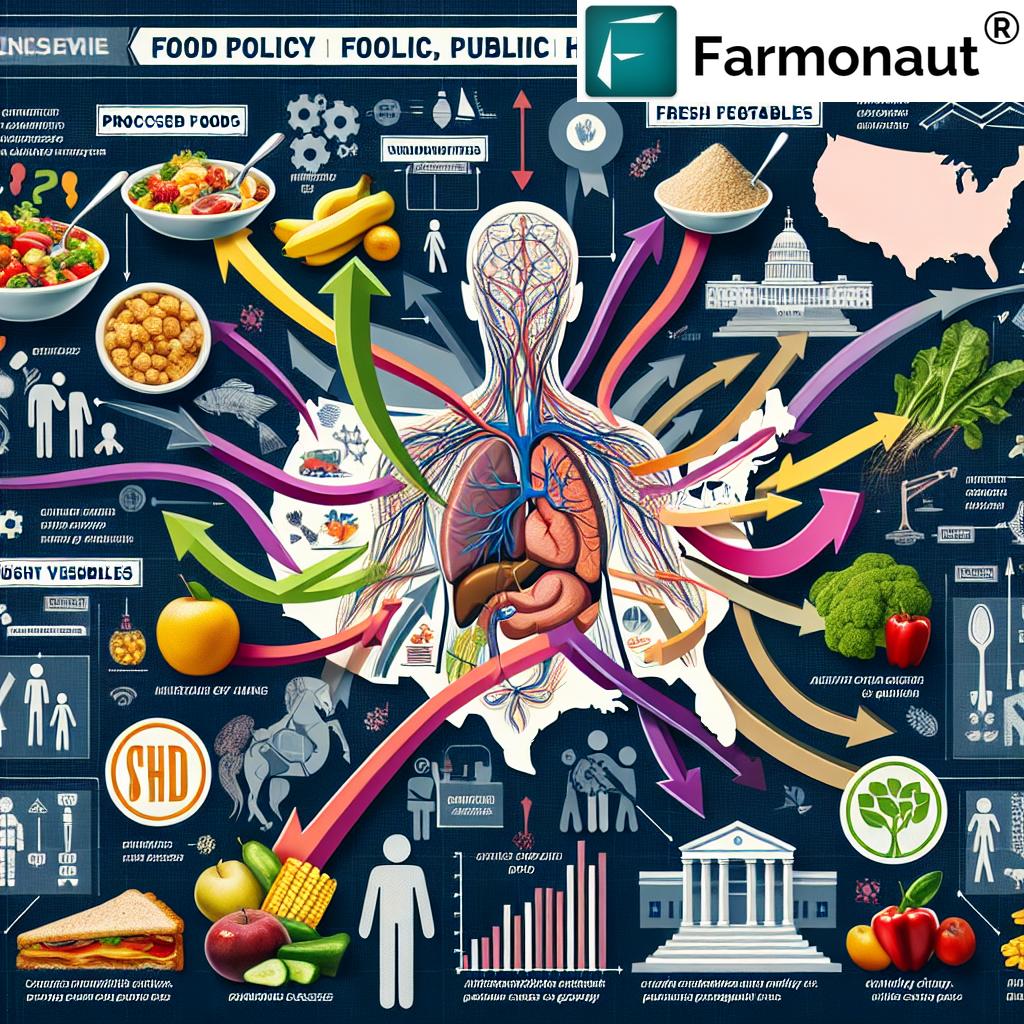Transforming US Agriculture: How Regenerative Farming and Healthy Food Policies Can Combat Chronic Diseases
“Over 60% of the American diet consists of ultra-processed foods, contributing to the obesity epidemic and chronic diseases.”
In recent years, the United States has faced a growing health crisis, with chronic diseases reaching epidemic proportions. As we delve into this critical issue, we’ll explore how our food supply, agricultural practices, and public policies interconnect to shape the health of our nation. We’ll also discuss how innovative solutions, including those offered by companies like Farmonaut, can contribute to a healthier, more sustainable future for American agriculture and public health.
The Current State of American Health and Agriculture
The United States is grappling with an unprecedented health crisis. Chronic diseases such as obesity, diabetes, and heart disease have become alarmingly prevalent, affecting millions of Americans and straining our healthcare system. At the heart of this crisis lies our food supply and the agricultural practices that support it.
- Obesity rates have skyrocketed from 3% to 74% in recent decades
- Processed foods dominate the American diet, often containing harmful additives
- Conventional farming practices have led to soil degradation and reduced nutrient content in our food
These issues have not gone unnoticed by policymakers. A recent Senate committee hearing highlighted the urgent need for healthy food policy reforms and a shift towards nutrition-based healthcare models. The discussion emphasized the importance of addressing the US obesity epidemic through improvements in school lunch programs and SNAP reforms.
The Role of Processed Foods in Chronic Disease
One of the primary culprits behind the rise in chronic diseases is the prevalence of processed foods in the American diet. These foods often contain a multitude of chemical additives, preservatives, and artificial ingredients that can have detrimental effects on our health.
Key concerns about processed foods:
- High in added sugars, unhealthy fats, and sodium
- Low in essential nutrients and fiber
- Often contain artificial additives with unknown long-term health effects
- Contribute to inflammation and oxidative stress in the body
The American food supply contains an estimated 10,000 ingredients, many of which are not found in foods in other countries like Japan or in Europe. This stark difference raises questions about the safety and necessity of these additives in our food system.
The Promise of Regenerative Agriculture
“Regenerative agriculture practices can sequester up to 10 times more carbon in soil compared to conventional farming methods.”
As we seek solutions to our health and environmental challenges, regenerative agriculture emerges as a promising approach. This farming method focuses on restoring soil health, improving biodiversity, and enhancing ecosystem services while producing nutritious food.
Regenerative agriculture benefits include:
- Improved soil health and fertility
- Enhanced water retention and reduced runoff
- Increased biodiversity on farms
- Carbon sequestration, helping to mitigate climate change
- Production of more nutrient-dense foods
By adopting regenerative practices, farmers can play a crucial role in not only producing healthier food but also in addressing environmental concerns such as soil degradation and water conservation.
Comparing Conventional and Regenerative Agriculture
To better understand the potential impact of regenerative agriculture, let’s compare it to conventional farming practices:
| Agricultural Aspect | Conventional Farming | Regenerative Farming |
|---|---|---|
| Soil Health | Depleted soil nutrients | Improved soil organic matter |
| Water Usage | High water consumption | Improved water retention and efficiency |
| Biodiversity | Reduced biodiversity | Enhanced ecosystem diversity |
| Carbon Sequestration | Limited carbon storage | Significant carbon sequestration |
| Impact on Chronic Diseases | Potential increase due to chemical residues | Potential reduction through nutrient-dense foods |
As we can see, regenerative agriculture offers numerous advantages over conventional farming methods, particularly in terms of environmental sustainability and potential health benefits.
The Role of Technology in Sustainable Agriculture
Innovative technologies are playing an increasingly important role in promoting sustainable and regenerative agricultural practices. Companies like Farmonaut are at the forefront of this technological revolution, offering advanced satellite-based farm management solutions that can support farmers in their transition to more sustainable practices.
Farmonaut’s platform provides valuable services such as:
- Real-time crop health monitoring
- AI-based advisory systems
- Blockchain-based traceability
- Resource management tools
These technologies can help farmers make more informed decisions about irrigation, fertilizer usage, and pest management, ultimately optimizing crop yields while reducing resource wastage.
Healthy Food Policy Reforms
Addressing the chronic disease epidemic in the United States requires not only changes in agricultural practices but also significant reforms in food policy. Recent discussions in Washington have highlighted several key areas for potential improvement:
SNAP Program Reforms
The Supplemental Nutrition Assistance Program (SNAP) plays a crucial role in providing food assistance to millions of Americans. However, there’s growing concern about the types of foods that can be purchased with SNAP benefits. Proposed reforms include:
- Limiting the use of SNAP benefits for processed and ultra-processed foods
- Incentivizing the purchase of fresh fruits, vegetables, and whole foods
- Providing nutrition education to SNAP recipients
School Lunch Nutrition Improvements
Improving the nutritional quality of school lunches is another critical area for policy reform. Potential changes include:
- Increasing the availability of fresh, locally-sourced produce in schools
- Reducing the use of processed foods and sugary beverages
- Implementing nutrition education programs for students
These policy reforms aim to create a healthier food environment, particularly for children and low-income families who are often most affected by chronic diseases.
The Impact of Food Additives on Health
A critical aspect of the chronic disease epidemic is the role of food additives in processed foods. Many of these additives have been linked to various health issues, including:
- Inflammation
- Hormonal imbalances
- Digestive problems
- Allergic reactions
Experts are calling for increased scrutiny of food additives and their potential health effects. This includes:
- More rigorous testing of additives before approval
- Ongoing monitoring of approved additives
- Clearer labeling of additives in food products
By addressing the issue of food additives, we can take a significant step towards improving the overall quality of the American food supply and, by extension, public health.
Towards a Nutrition-Based Healthcare Model
One of the most promising approaches to combating chronic diseases is the shift towards a nutrition-based healthcare model. This approach recognizes the fundamental role that diet plays in health and disease prevention. Key aspects of this model include:
- Emphasizing preventive care through dietary interventions
- Integrating nutritional counseling into primary care
- Promoting food as medicine concepts
- Researching the links between specific foods and health outcomes
By focusing on nutrition as a cornerstone of healthcare, we can potentially reduce the incidence of chronic diseases and improve overall public health outcomes.
Explore Farmonaut’s API for advanced agricultural insights
The Role of Sustainable Farming Practices in Soil Health and Water Conservation
Sustainable farming practices are not only crucial for producing healthier food but also play a vital role in preserving our natural resources. These practices focus on:
- Improving soil health through cover cropping and reduced tillage
- Implementing efficient irrigation systems to conserve water
- Using natural pest control methods to reduce chemical inputs
- Promoting crop diversity to enhance ecosystem resilience
By adopting these practices, farmers can contribute to both environmental conservation and the production of more nutritious food.
The Importance of Consumer Education and Awareness
While policy changes and agricultural reforms are crucial, consumer education plays an equally important role in transforming our food system. Raising awareness about the links between food choices, farming practices, and health outcomes can empower individuals to make informed decisions. Key areas of focus include:
- Understanding food labels and ingredient lists
- Recognizing the benefits of whole, unprocessed foods
- Learning about sustainable and regenerative farming practices
- Appreciating the connection between personal food choices and environmental impact
By educating consumers, we can create a demand-driven shift towards healthier, more sustainable food options.
Access Farmonaut’s API Developer Docs for integration guidance
The Future of American Agriculture and Public Health
As we look to the future, it’s clear that transforming US agriculture and food policies is essential for combating chronic diseases and improving public health. This transformation will require a multi-faceted approach, including:
- Widespread adoption of regenerative farming practices
- Implementation of healthy food policies at federal, state, and local levels
- Integration of nutrition-based healthcare models
- Continued innovation in agricultural technology
- Increased consumer awareness and education
By working together across sectors – from farmers and policymakers to healthcare providers and consumers – we can create a healthier, more sustainable food system that benefits both people and the planet.
The Role of Technology in Supporting Sustainable Agriculture
As we strive to transform US agriculture, technology plays a crucial role in supporting farmers’ transition to more sustainable practices. Farmonaut’s innovative platform offers a range of tools that can help farmers implement regenerative agriculture techniques more effectively:
- Satellite-based crop health monitoring for precise resource management
- AI-driven advisory systems for optimized farming decisions
- Blockchain-based traceability for enhanced supply chain transparency
- Resource management tools for efficient water and input use
These technologies empower farmers to make data-driven decisions that can improve crop yields while minimizing environmental impact.
Conclusion: A Call to Action for a Healthier America
Transforming US agriculture and food policies to combat chronic diseases is a complex but necessary undertaking. It requires the concerted efforts of policymakers, farmers, healthcare providers, technology innovators, and consumers. By embracing regenerative farming practices, implementing healthy food policies, and leveraging innovative technologies, we can create a food system that promotes health, sustainability, and resilience.
As individuals, we can contribute to this transformation by:
- Supporting local farmers who use sustainable practices
- Advocating for healthy food policies in our communities
- Making informed food choices that prioritize whole, unprocessed foods
- Educating ourselves and others about the links between food, agriculture, and health
Together, we can build a healthier, more sustainable future for American agriculture and public health.
Earn With Farmonaut: Join our affiliate program and earn 20% recurring commission by helping farmers save 10%. Onboard 10 Elite farmers monthly to earn a minimum of $148,000 annually—start now and grow your income!
Farmonaut Subscriptions
Frequently Asked Questions
Q: What is regenerative agriculture?
A: Regenerative agriculture is a farming approach that focuses on improving soil health, enhancing biodiversity, and restoring ecosystem functions while producing nutritious food. It includes practices such as cover cropping, minimal tillage, and crop rotation.
Q: How does processed food contribute to chronic diseases?
A: Processed foods often contain high levels of added sugars, unhealthy fats, and sodium, while being low in essential nutrients and fiber. They may also contain artificial additives that can contribute to inflammation and other health issues, increasing the risk of chronic diseases like obesity, diabetes, and heart disease.
Q: What are some key healthy food policy reforms being discussed?
A: Key reforms include improving school lunch programs to include more fresh, nutritious options; reforming SNAP to incentivize healthier food choices; and implementing stricter regulations on food additives and labeling.
Q: How can technology support sustainable farming practices?
A: Technologies like Farmonaut’s platform offer tools for precision agriculture, including satellite-based crop monitoring, AI-driven advisory systems, and resource management tools. These technologies help farmers make data-driven decisions to optimize yields while minimizing environmental impact.
Q: What can individuals do to support a healthier food system?
A: Individuals can support local farmers using sustainable practices, advocate for healthy food policies, make informed food choices prioritizing whole foods, and educate themselves about the connections between food, agriculture, and health.























Individuals can support local farmers using sustainable practices, advocate for healthy food policies, make informed food choices prioritizing whole foods, and educate themselves about the connections between food, agriculture, and health.